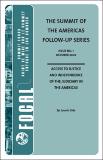| dc.description.abstract |
This is the first in a series of issue updates in which FOCAL examines howgovernments across the hemisphere have fared in upholding thecommitments made at past Summits of the Americas. This first reportfocuses specifically on reforms relating to the independence of thejudiciary, including measures to improve transparent judicial selection,guarantee secure tenure and support appropriate standards of conductand increased accountability. Reforms aimed at providing prompt, equaland universal access to justice are also examined. Consulting the mostrecent data and information available we consider the progress made inthis area since Quebec City and over the course of the last decade.The report’s findings are mixed. The success of reforms and their outcomeshave been uneven between and within countries. In the area ofindependence of the judiciary, judicial councils and changes in the lengthand security of judges’ tenure have laid the foundations for moreautonomous judiciaries. However, problems of corruption, executivecontrol and unlawful dismissal continue to plague courts throughout thehemisphere. It is argued that measures aimed at ensuring independencefrom other branches of government must be accompanied by a judicialcode of ethics and standards of accountability that guarantee theprofessionalism of judges and court officials.In terms of access to justice, research shows that while public defenders —state bodies that provide free legal council to low-income individuals —exist in countries across the hemisphere, they are in general understaffed,under-funded and have failed to evolve with the increase in demand fortheir services.The establishment of human rights ombudsmen (defensoríasdel pueblo) is highlighted as a bright spot in efforts to guarantee citizens’access to mechanisms of justice. However, to significantly andpermanently improve equal access governments must work to eradicatediscrimination and prejudice and improve information and public education about citizens’ legal and social rights. |

